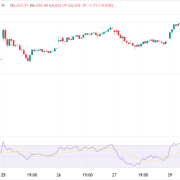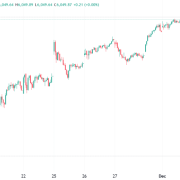
As 2024 draws to a close, it is clear that the year has been marked by seismic shifts across politics, economics, technology, and geopolitics.
From groundbreaking advancements in artificial intelligence to unprecedented changes in the cryptocurrency landscape, this year has been one of transformative events.
Political realignments, economic challenges, and new global conflicts have reshaped the world order, setting the stage for a complex 2025.
Donald Trump returns to the White House
Donald Trump’s victory over Kamala Harris in the 2024 US presidential election marked a historic political comeback.
Despite controversies surrounding the January 6 Capitol riot, Trump capitalised on economic discontent and immigration concerns to secure a win.
His return to the presidency signalled a potential shift in US foreign and domestic policy, with Republicans holding the slimmest House majority in history.
The implications of Trump’s presidency for global geopolitics remain uncertain, but early indications suggest a focus on reshaping trade and international alliances.
Bitcoin reaches $100,000 milestone
Bitcoin achieved a major psychological benchmark in 2024, crossing $100,000.
This milestone bolstered its status as a legitimate financial asset, attracting institutional and governmental interest.
Companies like MicroStrategy saw their stock valuations soar, while nations previously sceptical of crypto, including Japan and Russia, began considering Bitcoin reserves.
Major corporations like Amazon also explored integrating Bitcoin into their operations, signalling the cryptocurrency’s growing acceptance.
However, concerns over volatility persisted, highlighting the need for regulatory clarity and stability.
Spot Bitcoin ETFs revolutionise crypto investment
The approval of 12 spot Bitcoin ETFs by the SEC in January 2024 marked a historic moment for cryptocurrency.
The funds, which allowed retail investors to access Bitcoin through regulated markets, saw unprecedented success.
Within two months, Bitcoin shattered its previous record, crossing $70,000 in March.
By Christmas 2024, US-based Bitcoin ETFs managed over $105 billion in assets, representing nearly 5.7% of Bitcoin’s total supply.
Their rapid growth even outpaced gold ETFs, underscoring crypto’s growing institutional acceptance.
The development also prompted other markets, including the UK, to introduce Bitcoin-based exchange-traded products.
Ethereum ETFs soon followed, with altcoins vying for similar approval.
Anti-incumbency wave reshapes global politics
Elections in 2024 toppled political incumbents across the world.
Countries such as India, Japan, and South Africa saw dominant parties lose seats, often resulting in fragile coalition governments.
In the United States and United Kingdom, dissatisfaction with economic conditions and immigration policies led to sweeping changes in leadership.
French President Emmanuel Macron’s gamble on snap parliamentary elections backfired, threatening his presidency.
Similarly, Germany’s ruling coalition collapsed after poor state election results.
This global trend highlighted voters’ frustrations with stagnating economies and increasing scepticism about democratic governance.
AI pushes the boundaries of innovation
Artificial intelligence (AI) continued its meteoric rise in 2024, blending science fiction with reality.
The year saw groundbreaking advancements in AI applications, ranging from healthcare innovations to manufacturing efficiencies.
Highlighting AI’s significance, the Nobel Committees awarded prizes in physics and chemistry to pioneers in machine learning and protein structure prediction.
Despite the excitement, the AI revolution exposed limitations—notably the shortage of skilled professionals and the immense resource demands of training AI models.
These constraints reinforced fears of an expanding gap between wealthy and poorer nations.
Meanwhile, global discussions on AI regulation gained momentum but remained inconclusive as the technology’s rapid evolution outpaced policy frameworks.
China exports spark fears of a second shock
China’s economic trajectory took a decisive turn in 2024, reviving memories of the “China shock” from the early 2000s.
Facing internal economic challenges and declining consumer demand, Beijing doubled down on exports, ramping up subsidies to domestic manufacturers.
The resulting surplus overwhelmed global markets, with low-cost Chinese solar panels and electric vehicles flooding international trade routes. While these products facilitated greener transitions, many nations worried about their impact on local industries.
The European Union implemented measures to curb the influx of Chinese goods, while Brazil, India, and the United States imposed new tariffs. Washington’s tariffs are set to rise further in 2025, heightening trade tensions. Whether this escalation leads to greater conflict or fosters negotiations remains an open question.
Solana meme coins dominate crypto narratives
2024 became synonymous with the explosive growth of Solana’s meme coin ecosystem.
Platforms like Pump.fun catalysed the craze, propelling Solana’s meme coins to capture 7.65% of crypto market discussions.
Meme coins like Dogwifhat (WIF) and BONK experienced meteoric rises, with BONK recording a staggering 38,000% growth over two years.
This frenzy elevated Solana to the second-largest blockchain by total value locked (TVL), exceeding $8.6 billion, while SOL reached a record $263 in November. The extreme volatility of these assets posed risks, with most traders facing losses amid speculative trading.
Russia advances in Ukraine as war grinds on
The third year of Russia’s invasion of Ukraine saw significant developments.
Russia adopted a “meat-grinder” strategy in eastern Ukraine, gaining territory at the cost of heavy casualties—over 115,000 soldiers killed and 500,000 wounded.
Ukraine’s losses, while lower, were still devastating, with 43,000 soldiers killed and 370,000 wounded.
Amidst these losses, Kyiv launched cross-border attacks into Russia’s Kursk region, forcing Moscow to deploy North Korean troops to defend its territory.
Meanwhile, Western nations reversed long-standing policies, supplying Kyiv with advanced weapons, including long-range missiles. As 2025 begins, the question looms whether either side can sustain the attritional warfare that has defined the conflict.
Escalation in the Middle East
Hamas’ October 2023 attack on Israel triggered a year of violence and instability in the Middle East.
By 2024’s end, the death toll exceeded 45,000, and Gaza’s humanitarian crisis deepened.
Israel’s retaliatory actions included targeted strikes on Hamas leaders and Iranian-backed groups.
The conflict extended into Syria and Lebanon, where Israel’s operations significantly weakened Hezbollah and Bashar al-Assad’s regime.
Iran’s involvement escalated tensions further, with missile and drone attacks on Israel leading to retaliatory strikes that crippled Iranian missile production.
These events left the region more volatile, raising questions about the prospects for peace or further disorder.
Gary Gensler’s resignation reshapes crypto regulation
The resignation of SEC Chair Gary Gensler in November 2024 marked a turning point for US crypto policy.
Known for his stringent regulatory stance, Gensler’s departure raised hopes for a more favourable environment under his successor, Paul Atkins, a proponent of digital assets.
Under Gensler, the SEC pursued enforcement actions against major exchanges like Binance and Coinbase, causing friction within the industry. His exit created optimism for a shift toward policies encouraging innovation and growth in the crypto space.
Governments across the world crumble
In Bangladesh, mass protests in early August 2024 led to the resignation of Prime Minister Sheikh Hasina after a 16-year rule. Student-led demonstrations over alleged authoritarian practices forced Hasina to flee to India.
Nobel laureate Professor Muhammad Yunus now heads an interim government tasked with steering the nation towards democracy. However, questions remain about whether Yunus can rebuild democratic institutions or if political instability will persist.
France’s government fell on 4 December after Prime Minister Michel Barnier lost a no-confidence vote, the first such collapse since 1962.
Germany’s coalition government disintegrated due to financial disputes, with Chancellor Olaf Scholz dismissing Finance Minister Christian Lindner in November.
In Syria, opposition forces overthrew Bashar al-Assad’s regime on 8 December, ending 50 years of autocratic rule. The rapid fall of Damascus marked a major turning point for the region.
South Korea saw political turmoil on 3 December when President Yoon Suk Yeol declared martial law, later repealed following mass protests and parliamentary opposition.
The situation left the government paralysed, exposing deep divisions within the ruling party. While the South Korean government still stands, it is on shaky ground.
The post Recap 2024: Trump’s triumph, Bitcoin’s comeback and geopolitical turmoil appeared first on Invezz









